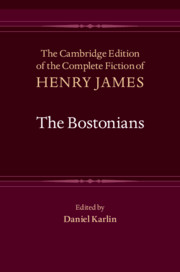Book contents
- Frontmatter
- Contents
- Acknowledgements
- List of Abbreviations
- General Editors’ Preface
- General Chronology of James’s Life and Writings
- Introduction
- Textual Introduction
- Chronology of Composition and Production
- Bibliography
- The Bostonians
- Glossary of Foreign Words and Phrases
- Notes
- Textual Variants
- Emendations
- Appendices
XIII
Published online by Cambridge University Press: 11 April 2021
- Frontmatter
- Contents
- Acknowledgements
- List of Abbreviations
- General Editors’ Preface
- General Chronology of James’s Life and Writings
- Introduction
- Textual Introduction
- Chronology of Composition and Production
- Bibliography
- The Bostonians
- Glossary of Foreign Words and Phrases
- Notes
- Textual Variants
- Emendations
- Appendices
Summary
MRS. TARRANT was delighted, as may be imagined, with her daughter's account of Miss Chancellor's interior, and the reception the girl had found there; and Verena, for the next month, took her way very often to Charles Street. “Just you be as nice to her as you know how,” Mrs. Tarrant had said to her; and she reflected with some complacency that her daughter did know — she knew how to do everything of that sort. It was not that Verena had been taught; that branch of the education of young ladies which is known as “manners and deportment” had not figured, as a definite head, in Miss Tarrant's curriculum. She had been told, indeed, that she must not lie nor steal; but she had been told very little else about behaviour; her only great advantage, in short, had been the parental example. But her motherliked to think that she was quick and graceful, and she questioned her exhaustively as to the progress of this interesting episode; she didn't see why, as she said, it shouldn't be a permanent “stand-by” for Verena. In Mrs. Tarrant's meditations upon the girl's future she had never thought of a fine marriage as a reward of effort; she would have deemed herself very immoral if she had endeavoured to capture for her child a rich husband. She had not, in fact, a very vivid sense of the existence of such agents of fate; all the rich men she had seen already had wives, and the unmarried men, who were generally very young, were distinguished from each other not so much by the figure of their income, which came little into question, as by the degree of their interest in regenerating ideas. She supposed Verena would marry some one, some day, and she hoped the personage would be connected with public life — which meant, for Mrs. Tarrant, that his name would be visible, in the lamplight, on a coloured poster, in the doorway of Tremont Temple. But she was not eager about this vision, for the implications of matrimony were for the most part wanting in brightness — consisted of a tired woman holding a baby over a furnace-register that emitted lukewarm air.
- Type
- Chapter
- Information
- The Bostonians , pp. 87 - 93Publisher: Cambridge University PressPrint publication year: 2019

